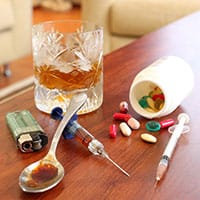Being addicted to more than one drug presents unique challenges for rehab centers. Generally speaking, it’s more difficult because there are two different foreign chemicals being introduced into the individual’s body, so both have to be considered separately from a medical perspective. Although the psychological requirements for individuals addicted to multiple drugs are roughly the same for those addicted to one, their body is likely to be at even greater physical risk. Medicines may be offered to ease the physical strain, but the psychological support is always the most essential part of treatment for any form of addiction.
Polysubstance Dependence
The word “polysubstance” is used in the Diagnostic and Statistical Manual for Mental Disorders in reference to anybody who has abused three or more classes of addictive substance (such as stimulants, hallucinogens, and depressants) in the last 12 months. One of the most important elements of the diagnosis is that the individual won’t have a preferred “drug of choice;” they’ll use different substances depending on the situation. Although somebody abusing two substances doesn’t technically qualify under this definition, the most important element is the psychological definition. For somebody to be considered polysubstance dependent, they have to meet at least three out of seven criteria. These are tolerance, withdrawal, inability to stop using, drug use interfering with activities (particularly ones you used to enjoy), spending extensive periods of time either getting or using drugs, losing control over the amount taken, and continuing to use despite negative psychological, physical, or social effects. If you meet three of these criteria, then you have some form of addiction and should seek suitable help. It doesn’t really matter if it’s technically not polysubstance abuse because only two drugs are involved; these are markers for any addiction and the fact that you abuse more than one substance will only combine the associated issues.
Medical Treatment
When it comes to the treatment of polysubstance abuse, the medications offered are extremely important but also potentially dangerous. The risks of illicit drugs—particularly during withdrawal—mean that in many cases medication may be required to help the individual get clean safely. If there is more than one drug, the risks of each have to be managed specifically. Because the drugs will usually span different classes, one treatment is unlikely to be effective. The illicit drugs could also have an interaction with some prescribed medicines, or the prescribed medicines could interact with each other. This underlines the importance of having professional medical assistance while you’re getting clean, because otherwise the combination of treatments could have damaging or even fatal effects. The level of medical treatment you’re likely to need depends on the drugs you are abusing. Generally speaking, substances like alcohol and sedatives place the user under more physical risk, and therefore need more intensive medical treatment. The most important thing to consider when receiving treatment for multiple drugs is that you will need to find a rehab center with the expertise to deal with all of the substances you abuse. Medication may take the form of substitute narcotics (such as methadone) if the individual is addicted to an opioid, or things like disulfiram (antabuse) if they’re addicted to alcohol. In some cases, medicines are also provided specifically to manage withdrawal symptoms.
Psychological Treatment
The psychological elements of treatment are much more important than the physical ones, even though not as obviously required. This is because addiction is a psychological condition, no matter how many substances are being abused. Most rehab centers focus on helping users with the psychological elements of the condition, which usually involves identifying the individual’s triggers and cues to use drugs and teaching them alternative coping mechanisms for those situations. The individual will be encouraged to identify the reasons they take drugs in the first place, and any harmful associations (such as a certain drug “helping” make them more “likeable” or “productive”) will be broken down. There are several approaches to the psychological side of polysubstance abuse treatment, but the most common are the 12 steps and cognitive behavioral therapy. Cognitive behavioral therapy addresses the thought processes (cognitive elements) that lead the individual to drugs and the behaviors which establish the trend throughout their life. By tackling these negative assumptions and identifying how their behavior is merely making the issue worse, cognitive behavioral therapy aims to overhaul the individual’s psychological approach to their lives. Twelve-step treatment revolves around the idea that addiction is a disease, and works through group counseling sessions. You come to terms with the fact that you have a problem, and undertake a program of soul-searching and psychological self-appraisal to help you overcome your addiction. No matter what your preferred method of psychological counseling, a good rehab program will offer both psychological and physical treatment options. It’s also absolutely essential that the center you choose has experts in both of the substances you used, because otherwise both issues might not be addressed in sufficient detail. As long as you receive adequate medical and psychological support, overcoming addiction to more than one substance is no different than doing the same thing with only one substance. It’s a different manifestation of the same condition, and as a result the treatment is basically the same. Sources: //wiki.addictiontreatmentmagazine.com//www.buppractice.com/howto/screen/polysubstance//www.drugabuse.gov/publications/drugfacts/treatment-approaches-drug-addiction//www.minddisorders.com/Ob-Ps/Polysubstance-dependence.html//www.mayoclinic.com/health/drug-addiction/DS00183/DSECTION=treatments-and-drugs

